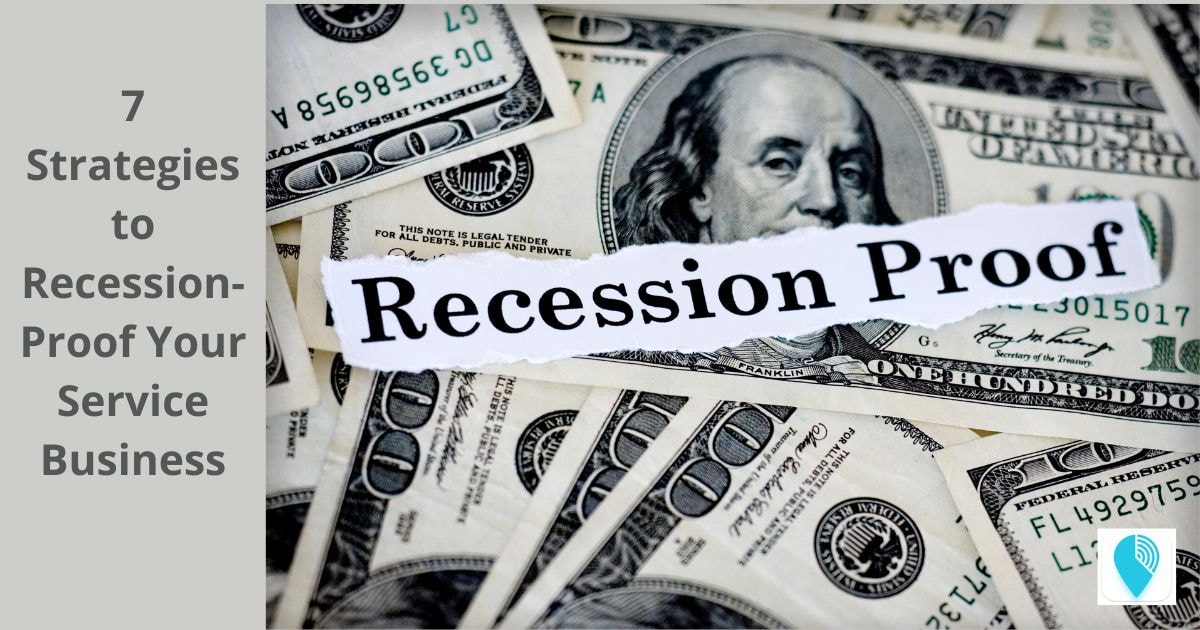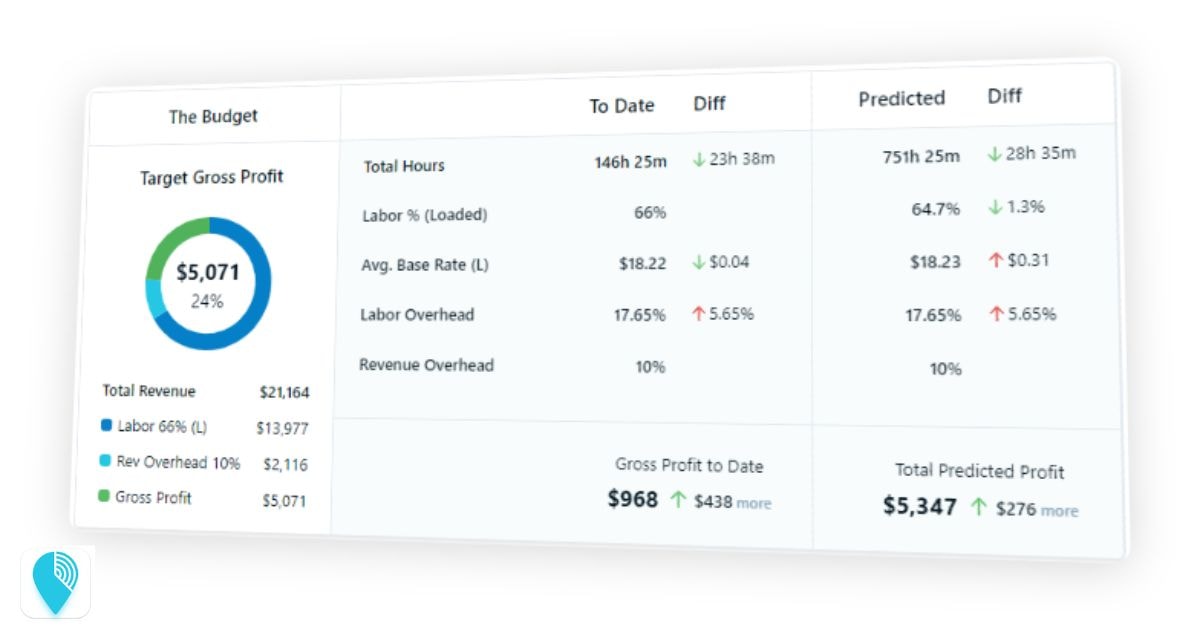How to Recession Proof Your Service-Based Business (7 Best Strategies)

In today's uncertain economic climate, service business owners must proactively protect their companies from potential downturns. As of 2024, the U.S. economy faces challenges, including persistent inflation concerns, rising interest rates, and ongoing global supply chain disruptions. While no business is entirely immune to economic fluctuations, there are strategies you can adopt to make your service business more resilient. This blog post will explore seven effective ways to recession-proof your service business, ensuring it remains strong and competitive even in challenging times.
Will you be prepared for the next recession?
Key Takeaways
-
Proactive planning and adaptability are essential for service businesses to survive and thrive during economic downturns.
-
Effective financial management, including cash flow planning and cost control, is crucial for maintaining stability in challenging times.
-
Focusing on customer retention and diversifying services helps create a resilient business model to weather economic uncertainties.
What We Will Cover:
- Understand Economic Downturns
- 7 Strategies to Recession-Proof Your Service Business
- 1 - Build a Cash Flow Plan, Including an Emergency Fund
- 2 - Diversify Revenue Streams
- 3 - Invest in Technology
- 4 - Monitor Key Performance Indicators (KPIs)
- 5 - Reduce Labor Costs
- 6 - Strengthen Client Relationships
- 7 - Train and Upskill Employees
- Summary
- Frequently Asked Questions
Understand Economic Downturns

Economic downturns are characterized by widespread declines in economic activity, commonly defined as two consecutive quarters of GDP decrease. These downturns are a natural part of the business cycle, occurring approximately every six years in the U.S., making them inevitable. The U.S. has had eight recessions in the past 50 years, with the Great Recession (2007–2009) being the most severe since the Great Depression.
Economic slowdowns serve as crucial lessons, teaching service businesses the importance of proactive planning and strategic adjustments before challenges arise.
When a recession hits, service businesses face many challenges, including decreased sales, tighter credit access, and increased bankruptcy rates. Small businesses, making up 99.9% of all U.S. businesses, are particularly vulnerable due to their lower financial resilience and often experience more severe impacts than larger companies. Therefore, strategic planning for tough times is not just advisable but necessary.
Adaptability becomes an essential trait for CEOs during these periods. It is critical to evaluate current offerings to ensure they solve real problems, especially as economic circumstances shift. Recognizing opportunities amidst challenges and adjusting to market needs can help businesses survive and thrive during downturns.
Let's discuss seven ways service businesses can recession-proof their operations.
7 Strategies to Recession-Proof Your Service Business

1 - Build a Cash Flow Plan, Including an Emergency Fund
A robust cash flow plan helps anticipate financial needs and mitigate risks during a financial crisis. A cash flow forecast, which involves estimating future sales and expenses, can guide business decisions and identify potential cash shortfalls before they become problematic. Regularly reviewing and adjusting the forecast keeps it accurate and reflects current economic conditions.
A business emergency fund is a vital part of a solid cash flow plan. Setting aside cash reserves to cover three to six months of essential expenses reduces reliance on debt financing during tough times. This financial buffer alleviates stress for business owners and provides the flexibility to seize unexpected market opportunities without incurring additional debt.
Focus on necessary costs, cut optional ones, and find savings to stay efficient while keeping quality high. Consider using small business budget templates to set priorities. Automation tools, such as employee time-tracking systems, can increase productivity by reducing time spent on mundane tasks like payroll administration, freeing business owners to focus on strategic initiatives.
It's also essential to understand and avoid the 7 deadliest cash flow mistakes.
2 - Diversify Revenue Streams

Diversifying revenue streams helps recession-proof service businesses by providing stability when one segment is hit hard by an economic slump. For instance, a commercial cleaning business has several opportunities to diversify its services, especially in light of current financial trends and changing business needs.
Expanding Service Offerings for Commercial Cleaning Companies
New revenue streams for commercial cleaning companies can range from specialized cleaning services like biohazard cleanup and medical facility sanitization to eco-friendly cleaning options and advanced disinfection services. Companies can also expand into related areas such as facility maintenance, indoor air quality services, pest control, landscaping, and even specialized event cleaning.
Some cleaning businesses might consider expanding into residential services or vehicle cleaning to tap into new markets. The key is considering existing strengths, client base, and potential return on investment before expanding. Gradual diversification, starting with services most aligned with current capabilities, can be a prudent approach to sustainable growth.
Additionally, recession-proofing efforts should focus on making existing offerings more attractive by altering features, pricing, or delivery methods to meet changing customer preferences. This adaptability can help maintain customer loyalty and ensure steady revenue streams despite the challenging economic environment, making your company as recession-proof business as possible.
3 - Invest in Technology

The U.S. Chamber of Commerce reports that for every 100 job openings, there are only 71 available workers. With the U.S. facing a tight labor market and rising wages, automation efforts, such as a GPS timekeeping system, can help offset increased labor costs.
Chronotek, a leader in the employee timekeeping industry for over 25 years, will accurately track employee hours, optimize scheduling, and streamline payroll processes. These improved operational efficiencies will reduce labor costs and minimize payroll errors, bolstering cash flow efforts as businesses navigate rising minimum wages across many states.
Automating routine tasks can save costs without compromising customer experience. For example, Chronotek Pro’s software provides real-time visibility of labor costs, helping service businesses stay on budget and make informed decisions. This technological edge can enhance operational efficiency and financial health during recessions.
4 - Monitor Key Performance Indicators (KPIs)
Tracking Key Performance Indicators (KPIs) can help service businesses survive during a recession by providing critical insights into business performance and enabling more effective decision-making. For instance, by regularly monitoring key performance indicators (KPIs), a business can quickly spot areas where performance is declining. This early detection allows prompt action to address issues before they become more severe, helping maintain stability during tough economic times.
KPIs also provide data on which services, departments, or processes are most profitable or efficient. This information enables the business to allocate resources more effectively, focusing on high-impact areas and reducing underperforming ones.
KPIs deliver concrete data that service business owners can use to make informed decisions rather than relying on guesswork. This is especially important during a recession when margins for error are smaller.
For example, do you know your up-to-the-minute labor costs, including overhead costs such as payroll taxes?
With Chronotek Pro, you can.

Customer KPIs measuring customer satisfaction, retention rates, and Net Promoter Score (NPS) provide insights into how well the business serves its clients. By improving these metrics, a company can strengthen customer relationships and reduce churn, which is vital during difficult times. Most people love the high-quality service and food they receive from Chick-fil-A, which relentlessly uses KPIs to measure store performance.
By continuously tracking and analyzing KPIs, a service business can maintain agility, make informed decisions, and focus on the most critical areas for survival and growth during a recession.
5 - Reduce Labor Costs

Reducing labor costs can be a crucial strategy for recession-proofing your business, particularly amid economic uncertainties. Labor costs are one of the most significant expenses for many companies, especially in the service sector with a remote workforce, and they directly impact profitability and financial resilience.
With rising wages and a tight labor market in many areas, many service businesses are seeing upward pressure on their labor cost percentages in the current economic climate. Last year, 86% of surveyed commercial cleaning businesses planned to raise wages. This plan to spend more money makes efficient labor management, including using tools like GPS time clock systems, increasingly crucial for maintaining profitability.
Twenty percent of Chronotek's timekeeping customers reported saving 20 percent on payroll, and 100 percent saved more money than their costs for the service.
Are you ready to get started?
Strategically managing labor costs is a cornerstone of recession-proofing your business, especially when facing economic uncertainties. The first instinct is to cut costs, but that doesn't have to come at the expense of work quality and customer retention.
For service sector companies, where labor often represents the most significant expense, optimizing these costs is crucial for maintaining profitability and building financial resilience.
Chronotek Pro is the best friend of any small business owner, as challenging times demand smarter business solutions.
6 - Strengthen Client Relationships

During economic uncertainties, retaining existing customers becomes even more critical than acquiring new ones. With consumer spending patterns shifting due to inflationary pressures, loyal customers provide a stable revenue base during a recession and can be an excellent source of referrals.
Consider these facts about customer retention:
-
Acquiring new customers costs 6-7 times more than keeping existing ones.
-
In the commercial cleaning industry, repeat business represents 37% of revenue, and most work (55%) comes from recurring services.
-
Existing cleaning customers spend 67% more than new ones
-
A 5% rise in customer retention rates can lead to a 25-95% increase in profits.
The evidence is clear: service businesses need to build customer loyalty. One way to keep your customer base happy is by consistently providing excellent service, which not all businesses do.
Let's discuss four specific strategies for building brand allegiance.
4 Ways to Keep Your Customers Happy During a Recession
1 - Use a CRM to Improve Customer Retention
Another way to improve customer retention is with a modern customer relationship management (CRM) system. A CRM will help you understand and respond to customer needs effectively. Personalized customer experiences are crucial, as 72% of customers engage only with tailored communications. Building customer trust is vital during economic challenges, as trust often wanes in tough times.
A CRM can also develop and track customer loyalty and feedback programs. Encouraging customer feedback demonstrates a proactive concern for your customer's satisfaction.
2 - Optimize Your Pricing Strategy
A well-crafted pricing strategy is crucial for weathering economic storms while maintaining profitability, especially with inflation rates higher than historical averages. Consider approaches like value-based pricing, which communicates your unique value proposition, and flexible pricing models that cater to varying client needs and budgets. Bundling services, offering seasonal specials, implementing dynamic pricing based on demand and economic indicators, and providing long-term contract discounts can also be effective.
For example, some commercial cleaning companies use value-based pricing to justify premium rates for eco-friendly services, while others offer discounted holiday rates to attract residential clients. By implementing a mix of these strategies, you can provide your business with the flexibility and resilience needed to navigate economic uncertainties. This approach allows you to maintain profitability while fostering long-term client relationships that can withstand economic recessions.
A strategic, flexible pricing approach is crucial for preparing your service business for when a recession hits. By focusing on value and customer needs, you can create models that weather downturns and strengthen client relationships. Your pricing should demonstrate your unique value, not just compete on cost. Whether through value-based pricing or service bundles, this approach can maintain profit margins and foster customer loyalty that endures through economic challenges.
3 - Keep In Touch
Maintain regular communication with your clients through newsletters, personalized emails, or check-in calls to stay top-of-mind and demonstrate your commitment to their success. Use these touchpoints to demonstrate empathy for their struggles during an economic downturn.
A CRM is an excellent tool for creating and tracking touchpoints with your customer base.
4 - Unlock 5 Ways Chronotek Pro Helps You Keep Customers
Chronotek Pro is your indispensable partner, equipped with tools to ensure you consistently deliver exceptional customer service. Tools such as:
-
Sends no-show alerts when employees don't show up to scheduled jobs
-
Captures accurate time at each customer location for precise billing
-
Notifies supervisors when employees leave job sites while on the clock
-
Monitor and measure service completion time for quality control
-
Provide specific instructions to employees on job boards through the communication hub
To learn more about how Chronotek Pro can help your business survive a recession, click on Tell Me More.

7 - Train and Upskill Employees

Training and upskilling employees is crucial for service companies during recessions. These efforts enhance efficiency and adaptability. Investing in employee development also reduces the high costs of employee turnover, which cost U.S. businesses $1 trillion in 2022. Companies that prioritize learning create a stable, skilled workforce ready to face economic challenges.
Cross-training employees will cultivate a versatile workforce, creating a more resilient operation in the face of economic uncertainties. Staff members proficient in multiple roles can seamlessly step in for absent coworkers, maintaining operational continuity without resorting to costly alternatives.
For instance, in a commercial cleaning company, a janitor trained in general and specialized floor care can cover for an absent floor technician. This flexibility ensures uninterrupted service and avoids the expense of bringing in a higher-paid supervisor.
Businesses can optimize their workforce, reduce labor expenses, and maintain operational efficiency even during economic slumps by strategically cross-training staff.
Training and upskilling create a resilient, versatile workforce crucial for navigating recessions. This multi-skilled team maintains service quality while managing costs, enabling companies to weather economic storms and emerge stronger. Such investment in staff capabilities fosters long-term sustainability and growth potential.
Summary of How to Recession Proof Your Service-Based Business
In today's unpredictable economic landscape, recession-proofing your service business is not just a precaution—it's a necessity. By implementing these seven strategies—from building a robust cash flow plan and diversifying your services to leveraging technology and investing in your workforce—you can create a resilient business that is prepared when a recession hits.
Remember, the key to success lies in proactive planning and continuous adaptation. Don't wait for a recession to hit before taking action. Start implementing these strategies today, and you'll safeguard your business against potential downturns and position it for growth and success in any economic climate.
With the right approach and tools like Chronotek Pro, your service business can emerge stronger, more efficient, and better equipped to serve your clients, no matter what challenges the future may hold.
Frequently Asked Questions

Q: What are the key signs of an economic downturn?
A: Economic downturns are typically characterized by two consecutive quarters of GDP decreases, decreased sales, tighter credit access, and increased bankruptcy rates.
Q: How can I build an effective cash flow plan for my service business?
A: Create a cash flow forecast, set up an emergency fund covering 3-6 months of expenses, and prioritize essential expenses over discretionary ones.
Q: Why is diversifying revenue streams important during a recession?
A: Diversification helps maintain stability when one segment is hit hard times, providing multiple income sources and reducing overall business risk.
Q: How can technology investments help recession-proof my business?
A: Technology can improve efficiency, reduce costs, and enhance competitiveness by automating routine tasks and improving data analytics.
Q: What are some effective strategies for reducing labor costs?
A: Implement efficient scheduling, cross-train employees, consider flexible work arrangements, and use time-tracking systems to optimize workforce management.
Q: How can I strengthen client relationships during economic uncertainties?
A: Focus on personalized communication, offer flexible pricing options, provide exceptional service, and implement loyalty programs to retain existing customers.
Q: Why is employee training essential for recession-proofing?
A: Training creates a versatile workforce that can adapt to changing needs, improves efficiency, and reduces the high costs associated with employee turnover.
Q: What pricing strategies can help during a recession?
A: To maintain profitability and attract clients, consider value-based pricing, flexible pricing models, service bundling, and offering long-term contract discounts.
Q: How often should I review my recession-proofing strategies?
A: Review and adjust your strategies regularly, ideally quarterly, to ensure they remain effective in changing economic conditions.
Q: Can small businesses effectively implement these recession-proofing strategies?
A: Yes, while the scale may differ, small businesses can and should implement these strategies, adapting them to their specific needs and resources.
Conclusion
In conclusion, navigating economic uncertainties is an inevitable part of running a service business. However, by implementing the strategies outlined in this post, you can significantly enhance your company's resilience and adaptability. From building a robust cash flow plan and diversifying your services to leveraging technology and investing in your workforce, each step contributes to creating a recession-proof business model.
Remember, the key to success lies in proactive planning and continuous adaptation. Don't wait for a recession to hit before taking action. Start implementing these strategies today, and you'll not only safeguard your business against potential downturns but also position it for growth and success in any economic climate.
By focusing on financial stability, operational efficiency, and strong client relationships, your service business can weather economic storms and emerge stronger on the other side. With the right approach and tools at your disposal, you can turn challenges into opportunities, ensuring your business thrives regardless of economic conditions.
Stay agile, keep innovating, and always prioritize delivering value to your clients. Your commitment to excellence and adaptability will be your greatest assets in building a truly recession-proof service business.




